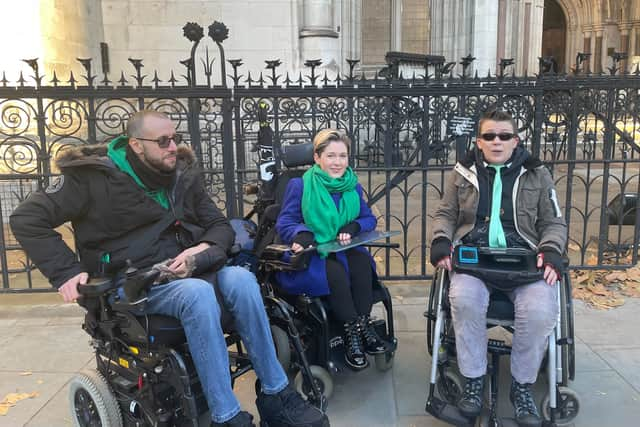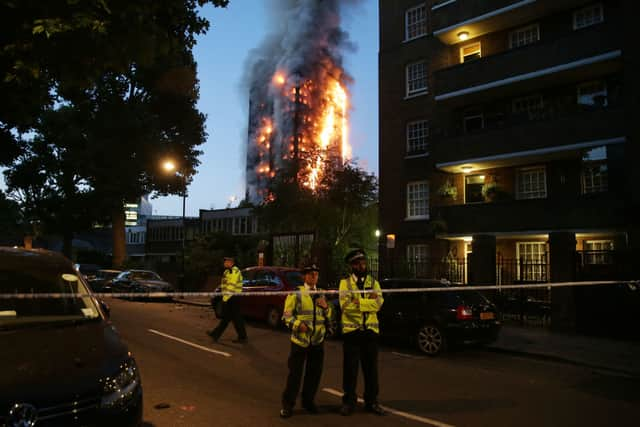Grenfell: government has ‘not yet’ decided whether to implement inquiry recommendations, High Court hears
and live on Freeview channel 276
The government has told the High Court it could still bring in Personal Emergency Evacuation Plans (PEEPs) for disabled people in high-rise buildings, despite ruling this out in May for “practicality, proportionality, and safety” reasons.
PEEPs were a key recommendation from the Grenfell Tower Inquiry, as more than 40% of the 72 victims of the fire were disabled. They provide personal guidance to people with accessibilty issues on how to respond to a fire alarm or escape from a building unaided in the case of an emergency.
Advertisement
Hide AdAdvertisement
Hide AdIn May, the Home Office made an official announcement stating it would not be proceeding with PEEPs as there were “significant issues” with the “practicality, proportionality, and safety”, and would instead look at “an alternative package of initiatives”.
This has led to a judicial review brought against the government by campaign group Claddag over its “failure” to follow guidance given in 2019 during the first phase of the Inquiry, specifically failing to bring in a legal requirement for PEEPs.
At the High Court today, barrister Alan Payne KC, who is representing the Home Office, told the judge that there is an ongoing consultation and the government is looking into ways to implement recommendations in a “proportionate and safe manner”. He also added that a “fresh” minister, who was not involved in the previous decision, will approach the matter with an “open” mind.
Claddag pointed to the announcement in May, ruling out legally mandating PEEPs. Barrister Raj Desai, who is representing Claddag, argued that the government’s position is “untenable” as “keeping the door open to voluntary adoption of PEEPs... cannot be conflated with openness to mandating a legal duty to put in place PEEPs”. He also said the government’s “failure” to implement PEEPs “conspicuously fails to identify and grapple with the public safety imperative” for the recommendation.


Advertisement
Hide AdAdvertisement
Hide AdMeanwhile the judge, Mrs Justice Stacey, also highlighted the chronology of events to the court. She said: “The Prime Minister stands up in House of Commons and says ‘we will implement all the recommendations.’ But somewhere along the way you change your mind about PEEPs. The recommendation was that these be implemented across the board, which you have not done.”
She also suggested that in the process of the government’s “change of mind”, the Home Office did not “invite a response to the question about whether or not PEEPs should be adopted.” This, she said, means “there is a gap in the process.”


Georgie Hulme, who, alongside fellow campaigner Sarah Rennie, brought the claim against the Home Office told NationalWorld: “The Home Office ignored the Grenfell Inquiry recommendations, even after the then Prime Minister stated in Parliament that they would be implemented. It has also ignored support for evacuation plans in the PEEPs consultation and instead chose to make a decision against implementation, due to post consultation meetings with parties of the housing sector, without anyone else having an opportunity to respond.
“The third consultation on information sharing and not on evacuation plans, appears a further diluting of anything robust, in helping protect the lives of those who cannot self evacuate. I haven’t heard anything in court (so far) that gives me any reason to think that the Home Office are still open to PEEPs.”
Advertisement
Hide AdAdvertisement
Hide AdMr Desai echoed this in his closing statement. He said: “It is clear that in some way, the door has been closed to PEEPs. Despite the Home Office’s argument, the new minister has not gone on the record and said that ‘whatever happened in the past, I will look into it with fresh eyes. This is full and fresh reconsideration on full implementation of PEEPs’. There is therefore no evidence for the court of any new openness to PEEPs.”
There was also a discussion over the government’s decision to maintain the ‘stay put’ recommendation that is currently in place for many high-rise buildings. Mr Payne claimed that “experts on dealing with and responding to fires” had told the government that the “stay put” policy is the “safer position in most situations.”
But Mrs Justice Stacey suggested there was a “misunderstanding” with ‘stay put’, as “if there is a fire in your flat, or in your neighbours, you do not ‘stay put’. You have to get out. So is it a mandatory consideration to consider how people who cannot self evacuate may be able to leave a building?”
Mr Desai interjected to agree, commenting: “We need to see evidence from the defendant of consideration of what will happen to disabled people when they need to evacuate in a stay-put building. The defendant is notably unable to point to any evidence that the decision-maker did grapple with any of this.”


Advertisement
Hide AdAdvertisement
Hide AdThe judicial review has come about as a consequence of the Grenfell Tower fire on 14 June 2017, which tragically killed 72 people. It was granted on five grounds:
- Failure to have regard to mandatory material considerations
- Breach of legitimate expectation as a result of a failure to consult on departure from the PEEPs recommendation
- PEEPs consultation process so unfair as to be unlawful
- Breach of public sector equality duty in the Equality Act
- Breach of the European Convention on Human Rights
Nearly half (41%) of those who died were disabled. Claddag’s legal team said earlier on in the hearing that “those who died were disproportionately persons with disabilities whose ability to self-evacuate was compromised.”
Sarah Rennie, one of the claimants, told NationalWorld she wanted to be at the hearing to be “a physical presence to remind the judge that there are real people behind this intellectual debate.”
Comment Guidelines
National World encourages reader discussion on our stories. User feedback, insights and back-and-forth exchanges add a rich layer of context to reporting. Please review our Community Guidelines before commenting.
